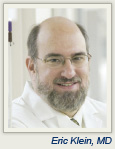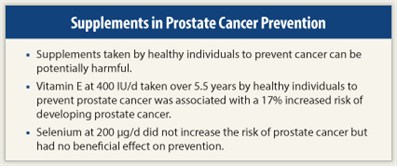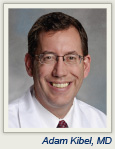 Supplements touted as preventing prostate cancer may turn out to be dangerous, as is evident from updated results of the largest long-term prevention trial, called the Selenium and Vitamin E Cancer Prevention Trial (SELECT). Final analysis of SELECT showed that, compared to placebo, vitamin E alone increased the risk of developing prostate cancer in otherwise healthy men by 17%.
Supplements touted as preventing prostate cancer may turn out to be dangerous, as is evident from updated results of the largest long-term prevention trial, called the Selenium and Vitamin E Cancer Prevention Trial (SELECT). Final analysis of SELECT showed that, compared to placebo, vitamin E alone increased the risk of developing prostate cancer in otherwise healthy men by 17%.
After an average of 7 years (5.5 years on supplements and 1.5 years off of them), vitamin E was associated with a statistically significant increased risk of prostate cancer, whereas selenium alone was not. For every 1,000 men who took placebo, there were 65 cases of prostate cancer over 7 years, and for every 1,000 men who took vitamin E, there were 76 cases of prostate cancer. These findings were published in JAMA on October 12, 2011,1 and presented at the 2012 Genitourinary Cancers Symposium.2
Trial Halted Early
“Healthy men who took a common dose of vitamin E [400 IU/d] supplementation alone for 7 years had a 17% increased risk of developing cancer vs the other three intervention arms. In men who developed cancer on either treatment, there was no difference between intervention arms for tumor aggressiveness. Increased screening or biopsy did not account for the increased risk of prostate cancer in the vitamin E arm,” said Eric Klein, MD, of the Glickman Urological and Kidney Institute of the Cleveland Clinic.
An interim analysis of SELECT showed that selenium at 200 μg/d and vitamin E at 400 IU/d, alone or in combination, had no beneficial effect on prevention of prostate cancer in otherwise healthy men. In 2008, the trial was halted early due to these results, but subjects continued to be followed.
SELECT enrolled 35,434 men aged 55 or older (or age 50 or older if they were African-American) at more than 400 study sites across the United States, Puerto Rico, and Canada.
All men stopped taking the study supplements (selenium at 200 μg/d, vitamin E at 400 IU/d, the combination, or placebo) when the study was halted prematurely. They continued to be monitored to determine the long-term effects of their study medications.
SELECT Biorepository
 Dr. Klein emphasized the potential dangers of taking supplements that have not been subject to rigorous study. “This study illustrates that supplements are biologically active and may be harmful. Half of the adult U.S. population take supplements, and it is a $23 billion a year industry. An estimated 50% of men over age 60 take vitamin E, and 23% take 400 IU per day. For agents with biology we don’t understand, postintervention follow-up is critical. We wouldn’t have found this if we didn’t continue our follow-up,” Dr. Klein told listeners.
Dr. Klein emphasized the potential dangers of taking supplements that have not been subject to rigorous study. “This study illustrates that supplements are biologically active and may be harmful. Half of the adult U.S. population take supplements, and it is a $23 billion a year industry. An estimated 50% of men over age 60 take vitamin E, and 23% take 400 IU per day. For agents with biology we don’t understand, postintervention follow-up is critical. We wouldn’t have found this if we didn’t continue our follow-up,” Dr. Klein told listeners.
The SELECT investigators are maintaining a biorepository of tissues from participants that includes blood, toenails, and prostate tissues. Blood samples will be used in extensive molecular analysis to understand the effects of the study agents and other hypotheses. Dr. Klein said that researchers interested in obtaining tissues should visit the Southwest Oncology Group website at www.swog.org/SELECT. ■
Disclosure: Dr. Klein reported no potential conflicts of interest.
Expert Point of View: SELECT Trial Update: Vitamin E Fails to Prevent Prostate Cancer in Healthy Men, Appears to Increase Risk
References
1. Klein EA, Thompson IM Jr, Tangen CM, et al: Vitamin E and the risk of prostate cancer: The Selenium and Vitamin E Cancer Prevention Trial (SELECT). JAMA 306:1549-1556, 2011.
2. Klein EA, Thompson I, Tangen CM, et al: Vitamin E and the risk of prostate cancer: Updated results of the Selenium and Vitamin E Cancer Prevention Trial (SELECT). 2012 Genitourinary Cancers Symposium. Abstract 7. Presented February 2, 2012.

 According to Adam Kibel, MD, Urology Chair at Brigham and Women’s Hospital in Boston, it would appear to be logical that increasing the doses of vitamin E and selenium would decrease the risk of prostate cancer, since the preponderance of evidence demonstrates that these supplements do so.
According to Adam Kibel, MD, Urology Chair at Brigham and Women’s Hospital in Boston, it would appear to be logical that increasing the doses of vitamin E and selenium would decrease the risk of prostate cancer, since the preponderance of evidence demonstrates that these supplements do so.